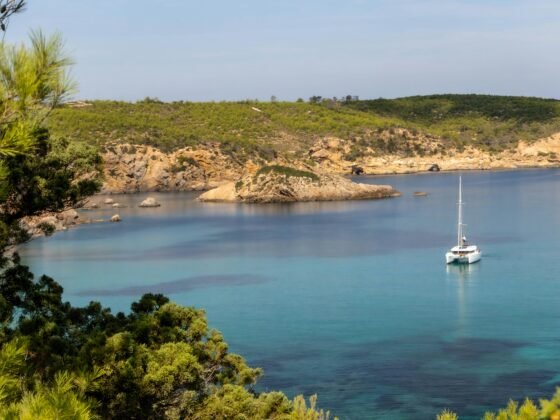Utsav Camp is an eco-conscious boutique retreat located on the fringes of Sariska Tiger Reserve in Rajasthan. Founded by naturalist Luv Shekhawat, the camp is a testament to thoughtful conservation, transforming barren land into a flourishing wilderness. The slow pace of life here is a real contrast to other destinations in Rajasthan, offering a chance to relax and connect with nature. It’s easily accessible from Delhi and would combine well with a classic tour of Rajasthan.

The journey is very straightforward—Utsav Camp is around four hours by road from Delhi, or just two and a half if you;re coming from Jaipur. Once you arrive, the pace immediately slows. Cradled by rugged hills and open skies, and surrounded by traditional villages, the camp has been carefully designed to blend seamlessly with its surroundings. If you’ve been to Ranthambore – this could not be more different.
Accommodation is understated yet stylish. Nine stone cabins, each spanning 900 square feet, are dotted across the property. Built using locally sourced materials, the cabins feature large windows, minimalist furnishings, and Indian crafts, with private verandahs opening onto gardens. It’s a thoughtful, simple space that allows nature to take centre stage. Facilities include a small infinity pool with views of the Aravalli Hills, a library, and lounge area—ideal spots to unwind between activities.
The ethos of the camp is rooted in sustainability. Solar energy, rainwater harvesting, and the use of natural materials underpin the design, while the team’s passion for conservation is evident throughout your stay.
Days here are best spent exploring. The camp arranges guided nature walks through the boulder-strewn Aravallis, birdwatching excursions, and cycling or hiking trails into the countryside. Wildlife enthusiasts can venture into Sariska Tiger Reserve on ‘Gypsy’ jeep safaris, with the chance to spot leopards, hyenas, antelope species, and, if you’re lucky, a tiger.
We did see a tiger – ST 30 – or Baghani II. Guides suspected she might be pregnant. What makes this truly remarkable is that Sariska, a former Royal hunting ground, had no tigers 20 years ago. It was the first reserve to successfully translocate tigers, starting in 2008. There are now over 30 in this little-known reserve, with ST30, the most recent arrival.
Beyond the chance of seeng tigers and other wildlife there are cultural outings including visits to the hauntingly beautiful 17th Century Kankwari Fort – an abandoned fort that has witnessed tales of royalty, rebellion and resilience – including the exile of Dara Shikoh, the heir to the Mughal throne in 1658.
The serene Neelkanth Temple complex is home to over 300 ancient temples and shrines, most of them dedicated to Lord Shiva, dating back to the 6th to 9th centuries when the region was ruled by the Pratiharas. There was barely a sole there.
One of my personal highlights was the Hyena Trail in the Boulders, which ended with surprise sundowners as we all scoured the rocks for leopard.

All the exploring can work up an appetite and meals were wholesome and fresh, with a focus on local, organic produce. Expect simple, home-cooked Rajasthani dishes with an emphasis on vegetarian dishes, alongside some international fare—for example, lunch of toasted sandwiches with chips and salad. The hospitality is warm and unfussy if a little slow at times; the team are knowledgeable, friendly, and passionate about the land they call home.
Best Time to Visit
- October to March – cooler months, great for wildlife and birdwatching.
- April to June – hotter, but better chances of tiger sightings in Sariska.
- Monsoon (July–September) – lush landscapes – restricted safari access.
Who is it best for?
• Birdwatchers, photographers, and nature lovers.
• Couples and solo travellers looking for a peaceful retreat.
• Adventure seekers interested in hiking, cycling, and exploring offbeat locations.
Who might not love it?
• Those looking for a classic tiger safari lodge – it’s more about nature than guaranteed big cat sightings.
• Visitors expecting five-star luxury – the experience is comfortable but rooted in simplicity.
• Travellers wanting fast-paced activities or nightlife – this is a slow-travel, eco-conscious destination.

Conclusion
I was fortunate to meet Luv during my stay. His dedication to conservation in this area was clear to see. He spoke about planting every tree on the land himself—starting with fruit trees, but later shifting to native species. This change came with guidance from his grandfather, a former forest officer, whose deep knowledge of the local ecosystem helped shape the camp’s rewilding journey.
What stood out most to me was the variety of experiences on offer and the refreshingly uncommercial feel of the area. The Hyena Trail, complete with surprise sundowners, was a memorable way to begin our time at Utsav Camp—and set the tone for a peaceful, immersive escape into nature.

Sara travelled to India with Explorers Against Extinction, staying at Utsav Camp in Alwar in a stone cabin for two nights in October 2023.












